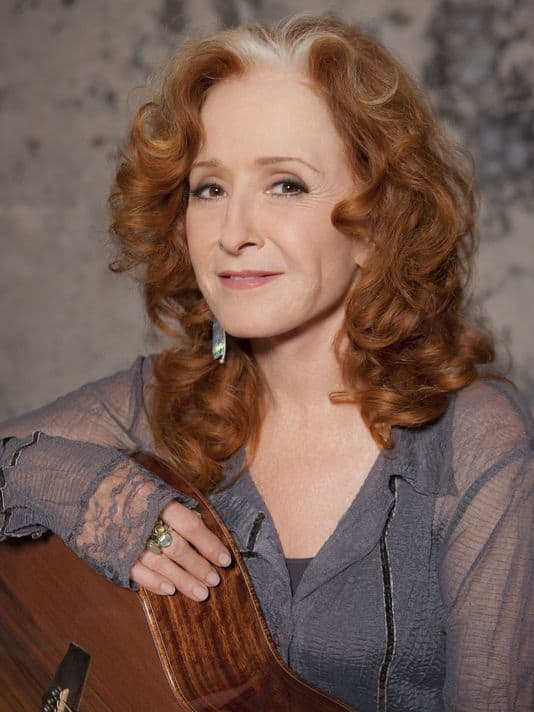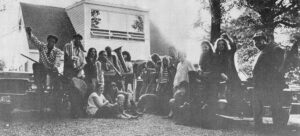
L. KENT WOLGAMOTT Lincoln Journal Star
Bonnie Raitt wanted to know about Pinewood Bowl.
Told that the amphitheater in Pioneers Park was built after World War II, is now surrounded by trees, but has only been used for concerts for five years, Raitt said she was eager to get to Lincoln for Tuesday’s show.
“I’m looking forward to playing this beautiful, as they call it, a jewel of an amphitheater,” she said. “It’s going to be really fun to see it. I’m so glad they built it years ago and have reinstated it.”
Then she was informed of those who have preceded her on the Pinewood stage this summer — Paul Simon, Bob Dylan and Ringo Starr.
“Wow, I’m honored to be in that company,” Raitt said. “I hope we do as well.”
A pioneering woman in blues rock, known for her slide guitar brilliance and singing that has been praised by the likes of Adele, Raitt fits easily with the other Rock and Roll Hall of Famers on the 2016 Pinewood lineup.
But she said she doesn’t think much about her legacy or impact.
“That’s sort of what journalists do about me, maybe,” Raitt said. “But I don’t sit and think about it myself. I’m happy when younger artists come up and say that I’m one of the few artists that both their parents and them like, that makes me proud — sometimes it’s three generations of fans … Now people like Adele have mentioned that she really loves the way I sing “I Can’t Make You Love Me.” She does a beautiful version herself. I think there’s a lot of women singers and musicians on the soul music end of things that I’m very proud that they cite me as someone that was an influence.”
The 10-time Grammy Award winner and her band will come into Pinewood with a show that features songs from “Dig in Deep,” which includes a handful of songs Raitt wrote following the long tour for “Slipstream,” her 2012 best Americana album winner.
“I wrote these songs on this new record so I could play them live,” she said in a call from Cincinnati. “That was really the impetus for coming up with a lot of the originals on this one. There were certain lyrical and musical things that I wanted to add to the show that we already have …
“I wanted to play piano on that shuffle of ‘What You’re Doing to Me.’ I love playing that style of piano. I rarely play piano in the set, I play it on ‘Nick of Time.’ …This was one that was a real barnburner that I could utilize my incredible B-3 player, Mike Finnigan, sitting next to me. We just tear it up every night playing that live …
“Between the political rocker, the piano song, the funk tune and a really cool song my guitarist sent me the music (for) called ‘If You Need Somebody,’ which is kind of a different take than I usually do but kind of in that Motown, Philadelphia soul genre that I love so much. It’s fun to add some new feel to the set.”
Some of those songs, including the album’s closer “The Ones We Couldn’t Be,” have very personal lyrics, reflecting on the passing of her parents and her older brother, while “The Comin’ Round is Going Through” takes on the flood of cash into politics and the rule of the 1 percent via Rolling Stones-ish rock.
“Both sides side of the spectrum can get pissed off about what’s wrong with the system,” said Raitt, an outspoken activist for decades. “I don’t pull any punches about my own leanings. But that’s not what that song’s about. … I don’t normally writes songs of that nature. I have one called ‘Hell to Pay’ that I wrote years ago when I was also kind of upset about the Moral Majority and the hypocrisy that was around that.
“But the last 10 or 15 years, with all the money, especially since Citizens United, this is not what democracy is for. It’s not what all those people died for. We’re supposed to have a representative government and a reasoned debate and everybody participating equally, not according to how much money they have. I’d had enough and I wanted to write a rocker that I could play and really get those feelings out every night and it’s been going over really well.”
That said, Raitt knows there are certain songs she has to play at every show — for good reason.
“‘I Can’t Make You Love Me’ and ‘Angel From Montgomery,’ I think people would revolt if I didn’t do them,” Raitt said. “And I would miss it myself. It’s new every night. I rearrange. Sometimes tour to tour I’ll put a different spin on ‘Angel From Montgomery’.’ I sing it and most of the ballads pretty different every night. It makes its fresh for me. Not too fresh, I know when you see Dylan sometimes it’s hard to tell what song he’s playing. Not that much.
“The audience changes every night and they have a right to see what they came to hear you play. They want to be able to hear a nice mixture of older stuff and new stuff and the hits they came for … I think the people who draw year after year, we understand how to serve the multiple needs of being fresh and freshening things up (but) also being able to honor the older songs that people want to come and hear, mostly in the form that they fell in love with them.”
“Angel From Montgomery” for Raitt dates to “Streetlights,” her 1974 album. But Raitt’s been playing far longer than that, starting in her bedroom when she was growing up in L.A. in the ‘50s and ‘60s. Picking up the acoustic guitar at age 8, she found the slide a few years later.
“I’d never really saw anybody play slide guitar until I’d already taught myself to play, in California, just in my room, trying to figure out how to do it,” Raitt said. “I’d heard ‘Blues at Newport’ when I was 14. I soaked the label off a Coricidin pill bottle and I put it on my middle finger. I tuned the guitar to open tuning and tried to mimic what I heard on record. I never had lessons. By the time I actually saw people playing the blues with a bottle neck guitar, I realized I had it on the wrong finger. It’s not really very practical on the middle finger. But it was too late to change because I’d been doing it for years.”
You still have it on your middle finger?
“Um hmm, oh yeah.”
Moving to Cambridge, Massachusetts, in the late ‘60s, Raitt studied at Harvard and Radcliffe. But, in her third year, Raitt turned to music full time, playing blues guitar and opening for the likes of Muddy Waters and John Lee Hooker.
Signed to Warner Brothers Records in 1971, Raitt was seen as a blues artist. But her musical palette has always been broader than simply the blues.
“My roots are as much Motown and R&B records, Aretha and Sam and Dave, as they are Mississippi Fred McDowell and Son House and Jackson Browne and John Prine … It’s the mixing of them together next to each other that appeals to me,” she said. “I would be bored if I had to stick to just blues or just ballads or just rock n’ roll songs. I think if you listen back to the early records, it’s pretty much the same mix. there’s just a little bit more blues and folk music because I wasn’t able to afford a band until my third album.”
Raitt’s popular breakthrough came in the late ’80s and continued through the ‘90s, when she sold more than 15 million albums, powered by hits like “Thing Called Love,” “Something to Talk About” and “Love Sneakin’ Up on You.”
Now, 45 years after her debut, Raitt has released “Dig In Deep” on the label she runs with her “mighty team of three women and myself,” and, typically, she’s speaking out about artist’s rights in the digital era in which streaming has supplanted album sales.
“There’s a lot of wonderful artists working on our artists rights to try to get a seat at the table when these record labels make a secret deal with the streaming companies and we have nothing to do with it. It’s just not fair,” Raitt said.
“Justice and fairness and leveling the playing field and proper pay for proper work is really important, no matter what job you’re in or what color you are. Fighting for that kind of stuff is something that’s part of being Quaker I think. Growing up in the ’60s, that whole protecting the earth and fighting for justice is something that’s just ingrained in a lot of people and I’m glad to see this younger generation is picking up the torch.”
Then it was time for a quick goodbye to make way for another interview.
“See you next week, enjoy the show,” she said. “I’m really looking forward to playing there. We love playing outdoors.”
If You Go
What: Bonnie Raitt with Richard Thompson Trio
Where: Pinewood Bowl, Pioneers Park
When: 8 p.m. Sept. 6
Tickets: $45, $59.50, $75, $96; Pinnacle Bank Arena ticket office, ticketmaster.com, Ticketmaster locations and at 800-745-3000
Source: © Copyright The Journal Star













 Visitors Today : 102
Visitors Today : 102 Now Online : 1
Now Online : 1















































































































